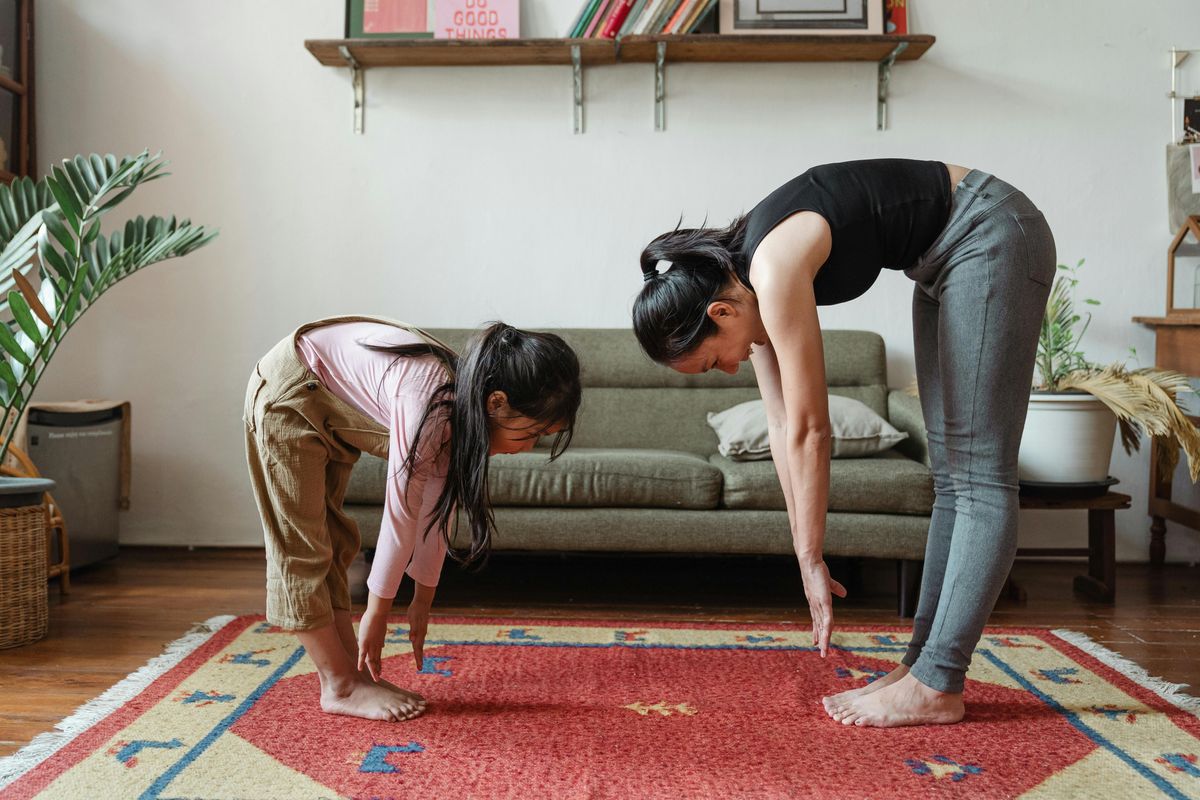30 simple, active learning games parents can play with kids that don't involve screens
People are loving these fun, wholesome ideas to get kids' bodies and brains moving.

Whole-body movement is good for children's development.
As every parent knows, kids have energy for days, and figuring out how to channel and focus that energy to preserve your home and your sanity can be a formidable challenge.
Sending kids outside when they're bouncing off the walls usually works, but that's not always an option. Often when kids are stuck inside, we resort to screens (which can overstimulate their sensory system) or calm indoor games (which don't stimulate their energetic bodies). Both have their place but aren't great for getting the wiggles out.
That's why parents are loving a viral video that demonstrates 30 simple, fun parent-child activities and games, combining full-body movement with fun challenges that stimulate both the body and the brain.
The video, shared on Facebook by Simple Life, has 55 million views and thousands of comments from parents praising the way it shows parents and kids doing fun, healthy, educational activities together without a screen in sight. And the best part is that most of them require simple props parents likely have around the house or that are easy and inexpensive to find.
For instance, in one game, a parent stands on a stool and tosses a tissue for a child to catch. Super simple, but tissues fall in unpredictable ways, so it requires a child to use their hand-eye coordination and quick reflexes.
Another example is a parent facing away from a child and tossing soft balls or stuffed animals behind them, with the child catching the items in a basket. Again, super simple, but builds gross motor coordination.
Watch:
Such whole body games can help children through important developmental stages, encouraging things like bilateral and midline-crossing movements, which are activities that requires kids to reach across their body. It may seem like a simple movement, but according to occupational therapist Colleen Beck, if a child has difficulties with crossing the midline, they will demonstrate challenges in almost every functional task.
Games like those shown in the video also help kinesthetic learners, who learn best through movement and tactile activities. Kinesthetic learners retain information primarily by doing, rather than seeing or hearing. But all kids benefit from a variety of teaching approaches, so these active, hands-on games that double as skills practice are good for everyone.
So many of the activities in this video are brilliantly simple, but things most of us simply wouldn't have thought of. Dropping tiles down a wall for kids to catch? Having them pick up balls with their feet? Who would think?
Even the balloon bum-wiping lesson in the beginning is a good way to simulate a vital skill. Notice how the woman demonstrates how to fold the toilet paper? A good first step for teaching a child personal hygiene.
Finally, these ideas offer ways to bond with your kids in fun, active ways that also sneakily teach skills and encourage strong physical development. Kids get to practice accuracy, speed and agility, parents get to watch their kids improve, and everyone has a good time doing it. And a bonus in the digital age: No screens involved. It doesn't get any more win-win than that.





 Rihanna Nails GIF
Rihanna Nails GIF A photo of Helen and Bill in their uniformsImages provided by Drew Coyle
A photo of Helen and Bill in their uniformsImages provided by Drew Coyle The map provided by Helen to Bill@crewdoyle/
The map provided by Helen to Bill@crewdoyle/ Helen and Bill, happy and and content, and oh so in love. Image from Drew Coyle
Helen and Bill, happy and and content, and oh so in love. Image from Drew Coyle Good luck trying to catch a gazelle.
Good luck trying to catch a gazelle. Chickens will eat just about anything.
Chickens will eat just about anything. There's actually a big difference between horses and zebras besides just the stripes.
There's actually a big difference between horses and zebras besides just the stripes. A photo of a portable carbon monoxide detector from Amazon
A photo of a portable carbon monoxide detector from Amazon


